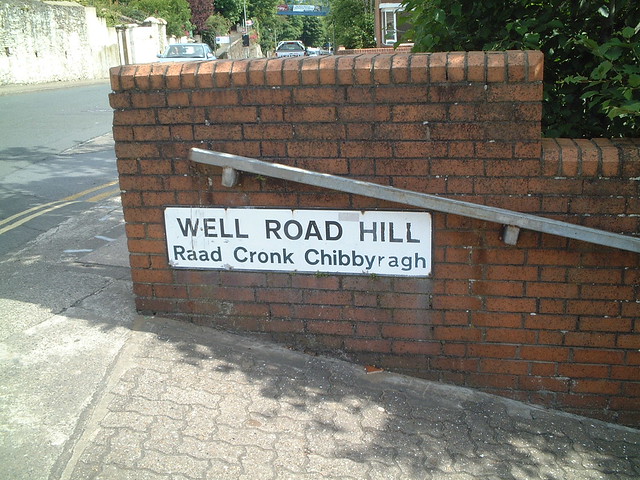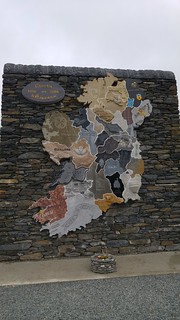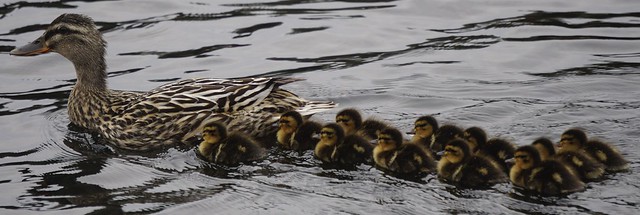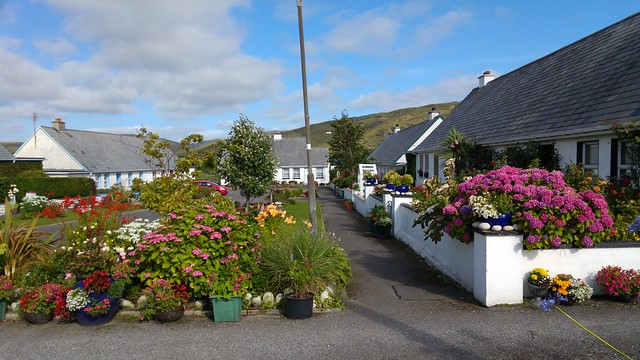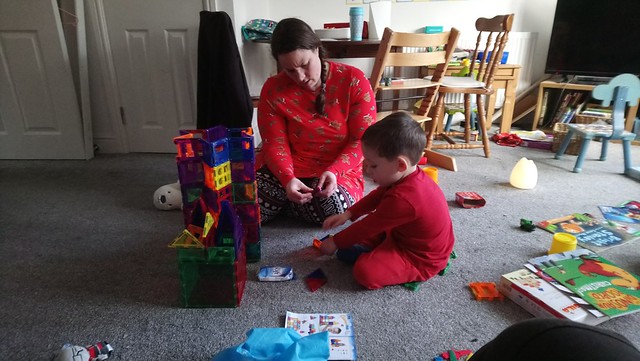Words for roads in Celtic languages.
Words marked with a * are reconstructions.
| Proto-Celtic | *bow-itros = road (“cow path”) |
|---|---|
| Old Irish (Goídelc) | bóthar = road, lane, track |
| Middle Irish (Gaoidhealg) | bóthar, báthar, bothor, bothar = track, road |
| Irish (Gaeilge) | bóthar [ˈbˠoːhəɾˠ / ˈbˠoːɾˠ / ˈbˠɔhəɾˠ] = road, way, manner taobh-bhóthar = side-road bóthar mór = main road bóthar iarainn = railroad, railway bóthar trasna = cross-road bóithreoir = road-walker, traveller, vagrant bóithreoireacht = (act of) walking, travelling the road, vagrancy bóithrín = country lane, boreen |
| Scottish Gaelic (Gàidhlig) | bòthar [boː.ər] = alley, lane |
| Manx (Gaelg) | bayr = lane, (country) road, roadway, pad, drive, avenue, thoroughfare beyr = lane bayr mooar = highroad bayr gleashtanagh = motorway bayr fo-halloo = subway |
| Middle Welsh (Kymraec) | beu der, benedyr = cattle track |
| Welsh (Cymraeg) | beudr = cattle track |
| Old Cornish | bouder = lane |
| Middle Cornish (Cernewec) | bounder = feeding ground, pasture, common, lane bounder tre = village |
| Cornish (Kernewek) | bownder [‘bɔʊndɛr / ‘bɔʊndɐr] = farm lane, lane |
Etymology: from Proto-Celtic *bāus (cow) and *itos (path [?]), from PIE *gʷṓws (cattle) and *h₁itós (passable) [source].
| Old Irish (Goídelc) | rót [r͈oːd] = road, highway |
|---|---|
| Middle Irish (Gaoidhealg) | rót = road, highway |
| Irish (Gaeilge) | ród [ɾˠoːd̪ˠ / ɾˠɔːd̪ˠ] = road, roadstead, route, anchorage, mooring ródaí wayfarerm rover, road guide ródaíocht = wayfaring, travelling, wandering from house to house tale-bearing, riding at anchor ródán = little road, path |
| Scottish Gaelic (Gàidhlig) | rathad [r̪ˠa.ad] = road, way, route, path, track rathad-iarainn = road, way, route rathad goirid = shortcut rathad-mòr = highway, major road, highroad rathadach [r̪ˠa.ədəx] = pertaining to or abounding in roads, ingenious, capable, go-ahead, enterprising rathad-beag = minor road rathad aon-slighe = one-way road |
| Manx (Gaelg) | raad [reːd̪ / raːd̪] = road, track, route, direction, roadway, trail, way; vent, vent-hole raad elley = elsewhere raad ennagh = somewhere raad erbee = any place, anywhere raad mooar = highway, main road, major road raad shaghnee = by-pass raad ushtey = waterway raad yiarn = railway (line) |
| Welsh (Cymraeg) | rhawd = course, way, path, journey, career, period |
| Middle Breton (Brezonec) | rout = route, trace, itinerary |
| Breton (Brezhoneg) | roud = route, trace, itinerary roudenn = line, ray, stripe rouder = road roudoureg = to ford (a river) |
Etymology: possibly from Middle English rode (riding, ride, voyage), from Old English rād (riding, hostile incursion), from Proto-West Germanic *raidu (riding, ride), from Proto-Germanic *raidō (a ride), from PIE *reydʰ- (to ride). Words from the same roots include road and raid in English.
Alternatively, the Goidelic words come from Old Irish rout, from ro-ṡét, from ro- (very, great) and sét (path), from Proto-Celtic *φro-sentu- [source].
| Old Irish (Goídelc) | forás = growth, increase |
|---|---|
| Middle Irish (Gaoidhealg) | forás, foras = growth, increase |
| Irish (Gaeilge) | forás = growth, development, progess |
| Scottish Gaelic (Gàidhlig) | foraimh [r̪ˠa.ad] = journey, excessiveness (archaic) foras [fɔrəs] = growth, increase, (river) ford |
| Proto-Brythonic | forð [forð] = road, path, way, mannerh |
| Middle Welsh (Kymraec) | ford, fort, fordh, forth = road, way, street, path yforthaul, ffordawl = traveller wayfarer, passer-by |
| Welsh (Cymraeg) | ffordd = road, way, street, path, passage, course, route, journey fforddiadol = acquianted with the road ffordd(i)af, fforddi(o) = to make a way, instruct, direct, guide, travel fforddol(yn) = traveller wayfarer, passer-by, road-mender fforddolaf, fforddoli = to journey, traverse, guide, direct, train fforddoliaeth = direction, instruction ffordd(i)wr = guide, instructor, wayfarer cyffordd = junction croesffordd = crossroads rheilffordd = railway\ |
| Old Cornish | ford = way, road, manner |
| Middle Cornish (Cernewec) | fordh, ford = way, road, passage |
| Cornish (Kernewek) | fordh [fɔrð] = way, road, manner fordh a-dro = roundabout fordh dhall = cul-de-sac, dead end fordh dhibarth = junction fordh veur = highway fordh dremen |
| Breton (Brezhoneg) | forzh = vagina |
Etymology: from the Old English ford (ford) [source], from the Proto-West Germanic *furdu (ford), from Proto-Germanic *furduz (ford), from the Proto-Indo-European *pr̥téw-/*pértus (crossing) [source]. Words for ford in the Brythonic languages come from the same PIE root.
Sources: Wiktionary, Am Faclair Beag, Online Manx Dictionary, Teanglann.ie, eDIL – Electronic Dictionary of the Irish Language, In Dúil Bélrai English – Old Irish glossary, Geiriadur Prifysgol Cymru, Gerlyver Kernewek, Dictionaire Favereau, TermOfis, English – ProtoCeltic WordList (PDF), Etymological Dictionary Of Proto Celtic
